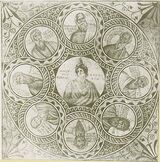The Seven Sages of Greece

The Muse Calliope anticlockwise surrounded by Socrates and the Seven Sages - Solon, , Thales, Bias , Cleobulus, Periandros, Pittacus and Chilon.
(c. 620 BC–550 BC) was the title given by Greek tradition to seven wise ancient Greek men who were philosophers, statesmen and law-givers. The Seven Sages are known for their practical wisdom which "consisted of pithy and memorable dicta".
Pittacus Lore claims that Seven of the Elders went to the Greece and introduced it to more advanced ways of thinking, and set about ending the war that plagued it. They became known as the Seven Sages of Greece and have become part of the country’s history.
The Seven Sages[]
Given the fact that Pittacus went by the same name during his time as a sage, may give an indication as to the names of the other six Elders who joined him.
- Cleobulus of Lindos - "Moderation is the chief good." He governed as tyrant of Lindos, in the Greek island of Rhodes, circa 600 BC.
- Solon of Athens - "Nothing in excess." Solon (c. 638–558 BC) was a famous legislator and reformer from Athens , framing the laws which shaped the Athenian democracy.
- Chilon of Sparta - "You should not desire the impossible." Chilon was a Spartan politician from the 6th century BC, to whom the militarization of Spartan society was attributed.
- Bias of Priene - "Most men are bad." Bias was a politician and legislator of the 6th century BC.
- Thales of Miletus - (c. 624 BC – c. 546 BC) Thales is the first well-known philosopher and mathematician. His advice, "To bring surety brings ruin." was engraved on the front facade of the Oracle of Apollo in Delphi.
- Pittacus of Mytilene (c. 640–568 BC), governed Mytilene (Lesbos) along with Myrsilus. He tried to reduce the power of the nobility and was able to govern with the support of the popular classes, whom he favoured. He famously said "You should know which opportunities to choose."
- See: Pittacus Lore (Lorien Era)''
- Periander of Corinth (fl. 627 BC): he was the tyrant of Corinth in the 7th and 6th centuries BC. During his rule, Corinth knew a golden age of unprecedented stability. He was known saying "Forethought in all things."
